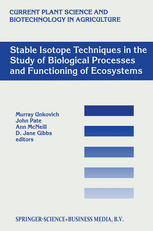

Most ebook files are in PDF format, so you can easily read them using various software such as Foxit Reader or directly on the Google Chrome browser.
Some ebook files are released by publishers in other formats such as .awz, .mobi, .epub, .fb2, etc. You may need to install specific software to read these formats on mobile/PC, such as Calibre.
Please read the tutorial at this link: https://ebookbell.com/faq
We offer FREE conversion to the popular formats you request; however, this may take some time. Therefore, right after payment, please email us, and we will try to provide the service as quickly as possible.
For some exceptional file formats or broken links (if any), please refrain from opening any disputes. Instead, email us first, and we will try to assist within a maximum of 6 hours.
EbookBell Team

0.0
0 reviewsIn the last two decades technological advances in isotope ratio mass spectrometry have been very rapid, opening up new possibilities for analysis of biological and environmental materials. The new instrumentation has facilitated faster analysis of samples via automated sample preparation and multi-isotope analysis of single samples, resulting in considerable cost savings, and enabling access to isotope analysis for many more researchers. These changes are reflected in the rapidly growing international literature on stable isotopes. While there have been some excellent books and review papers aimed at interpreting isotope signals in biology and environmental science, there have been fewer attempts to provide practical tools for researchers making forays into this exciting new arena. This book aims to address this inadequacy by providing a set of practical guidelines for the application of a range of novel and well proven stable isotope techniques to the fields of plant physiological ecology, agriculture, marine ecology and palaeoecology. The book is the outcome of a weeklong workshop held under the auspices of the Cooperative Research Centre for Legumes in Mediterranean Agriculture (CLIMA 1992 - 2000) at The University of Western Australia and the CSIRO Floreat Laboratories, Perth, Western Australia, in February 1999. The workshop was designed to provide practical tools and experiences for researchers and students concerned with how one goes about using stable isotopes in field investigations.